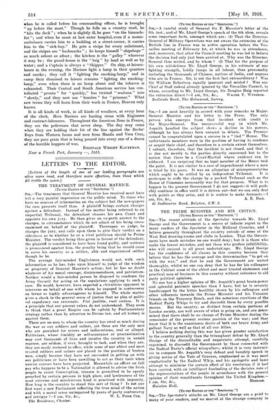THE PRIME MINISTER AND HIS CRITICS.
[To THE EDITOR OF THE " SPECTATOR.") SIR,—The recent attitude of the Spectator towards Mr. Lloyd George and the Government is a source of infinite regret to the many readers of the Spectator in the Midland Counties, and I believe generally throughout the country outside of some of the West End drawing-rooms and clubs in London. That the Govern- ment have made mistakes no one would deny; but it is those who make the fewest mistakes, and not those who profess infallibility, who will succeed in all great undertakings. Mr. Lloyd George has the confidence of all classes in this country because they believe that he has the courage and the determination "to get on with the war," and that he and the Government are united thoroughly, whilst no one can deny that he has for his colleagues in the Cabinet some of the ablest and most trusted statesmen and practical men of business in this country without reference to old party political opinions.
No one has a higher opinion of Mr. Asquith's great brain-power and splendid patriotic speeches than I have, but he is severely handicapped by the bitter hostility shown by his colleagues and other influences towards the Prime Minister and his Unionist friends on the Treasury Bench, and the notorious exertions of the Radical Party Whips to try and discredit them by every possible means. But the country, as distinct from certain portions of London society, are well aware of what is going on, and are deter- mined that there shall be no change of Prime Minister during the remainder of the present serious position of the war; and they know that it is the unanimous desire of both our brave Army and gallant Navy as well as that of all our Allies.
I believe nothing during this war has given greater satisfaction to the country generally than the triumphant defeat by Mr. Lloyd George of the discreditable and unpatriotic attempt, carefully organized, to discredit the Government by those connected with the Radical Party's official wirepullers; whilst it is very instruct- ive to compare Mr. Asquith's very defiant and haughty speech in giving notice of the Vote of Censure, emphasized as it was most emphatically by the Radical Whip, and his apologetic and lame attempt to minimize the certain effect of his resolution if it had been carried, with an intelligent foreboding of the decisive vote cf the representatives of the people in accordance with the general opinion of their constituents throughout the United Kingdom.—


























 Previous page
Previous page